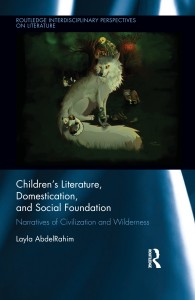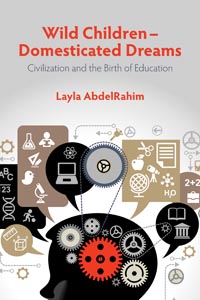I am an independent scholar and author with no institutional funding. Please, consider supporting me on Patreon so I can continue to do the work. Thank you!
Childhood, Ferocious Sleep: Counterpunch book review by MARTIN BILLHEIMER
In her recent critique of kids’ books, Children’s Literature, Domestication, and Social Foundation (Routledge; PB edition, 2018), Layla AbdelRahim recounts this striking tale from Onchukov’s collection of North Russian folk stories:
A man was walking to Njonoksa, on the bridge… he saw a she-devil rambling: “A dress to impress I had; everything was taken away; but today, into the water I probe in a fashionable German robe, all bright, and with a haircut short and never will I emerge again, and never will show my voice.
Her admirable English translation parodies pedagogical grammar in a kind of beat hopscotch: dress/impress is serpentine; robe/probe sounds slightly lewd (and why is the robe German, not Dutch or Turkish?). The haircut seems an unexplained rite (short, shameful?). You cannot show a voice, but a face – yet certainly a voice shows something? Colossal stature, or its opposite in a visual gag. The babbling she-devil is a loopy relative of the Grimm Scissor Man or the Japanese snow witch. Note that she’s met on a ramble, where all songs and accidents start (or end: ‘No more I’ll go a roving’). And bridges are common places for strange meetings, once upon a time.
…The argument of Children’s Literature is that most Western childhood classics contain, consciously or unconsciously, a virulent antipathy toward the natural world, animals and animal nature, and the Commons. Fear of the wilderness is a preoccupation of this morose literature, represented in mythic or animal forms that both allure and terrify. The result is the inculcation of the arid outlines of commodity relations over the vigorously dialectical childhood mind. Even when children’s books offer a critique of that terrible project which begins at childhood’s end – Adulthood – the best it can muster is a kind of sentimental admission of defeat, exemplified by A. A. Milne’s final paragraph in Winnie the Pooh.
…AbdelRahim’s critiques of Lewis Carroll, Frank Baum, Milne, Lewis and Sendak are incisive and carefully thought through, stated clearly but with a true feel for poetics and ambiguity. As arguments, they are probably irrefutable.
Full review HERE
Filed in: Uncategorized.









